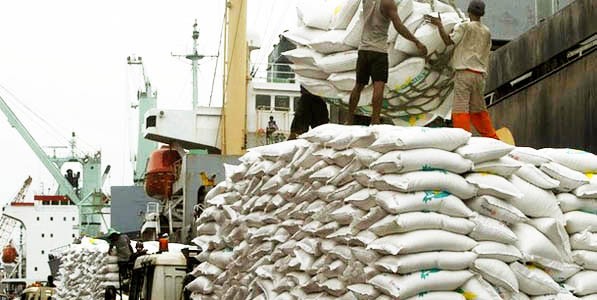
REVEALED: How Illicit Rice Importation is Threatening FG’s Agricultural Sector Interventions
In a deliberate effort to boost local rice production and increase its market value, President Muhammadu Buhari had in August 2019 directed the closure of land borders and equally banned the importation of foreign rice.
Thus, imports into Nigeria are to come through seaports, where customs duties can be imposed more easily than at land borders.
The move was meant to checkmate the influx of foreign rice that was being smuggled into the country through our porous land borders.
The period under review witnessed unprecedented activities in the agricultural sector, especially rice production. Local production was boosted and the value in terms of accruing profits to the farmers hit an all-time high.
However, on December 16, 2020, the President ordered the reopening of four borders including Seme in Lagos, Illela in Sokoto, Maigatari in Jigawa, and Mfum in Cross River states.
Also in April 2022, President Buhari, through the Nigeria Customs Service (NCS) approved the reopening of four more land borders. The borders were Idiroko in Ogun, Jibiya in Katsina, Kamba in Kebbi, and Ikom in Cross River states.
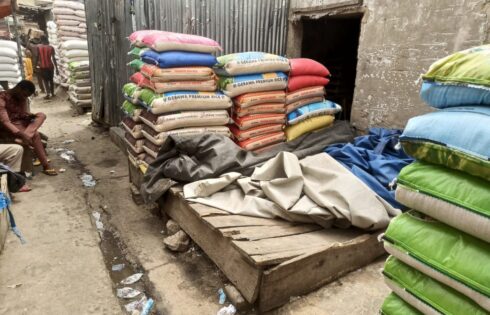
However, despite these strict measures imposed by the federal government, foreign rice mainly from Thailand and India continued to find their way into Nigerian markets through Benin and Niger Republic. They were being illicitly imported through smuggling activities.
Despite concrete and visible interventions of the Central Bank of Nigeria (CBN) via the Anchors Borrowers Programme (ABP) on the rice sub-sector of the Nigerian economy, the previous investigation by Economic Confidential in 2019 indicated that over 70% of rice in Nigerian markets was foreign.
In the same vein, a recent survey conducted by Economic Confidential also showed that foreign rice still floods into Nigerian markets, a development which on the other hand undermines the demands and value of the locally produced rice in the country.
While the local rice dealers complained bitterly about how the massive presence of foreign rice devalues their commodity, the farmers also lamented the costly nature of agricultural inputs and lack of modern implements as the major challenges they are facing
Investigation
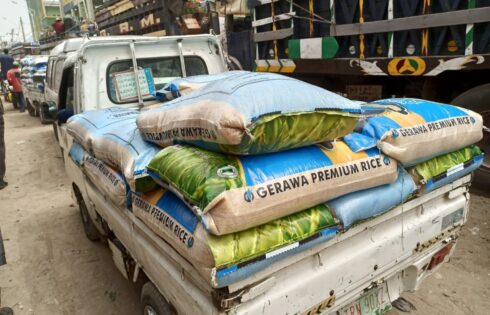
A recent survey conducted by Economic Confidential shows that foreign rice still floods many Nigerian markets, a development that is undermining the demand and value of locally-produced rice.
At Singer and Kura Rice Market in Kano as well as Katsina Central Market in Katsina and Ultra Modern Market in Jigawa States, there is actually foreign rice in abundance, but only presented to intending buyers on demand.
In most of the shops visited at the markets by our Economic Confidential reporter both foreign and local rice is being traded, however only the latter is displayed visibly for potential customers to see.
Some of the varieties of locally produced rice sighted by our reporters included Umza, Al-hamsad rice, Gerawa rice, Labana Rice, Mighty Pure Rice, Tiamin, Fursa and Tomato King. Their selling price at the markets ranges from N30,000 to N33,000, while the foreign ones like Thailand rice is sold between N34,000 to N37,000.
RESPONSE BY RICE DEALERS IN THE NORTH
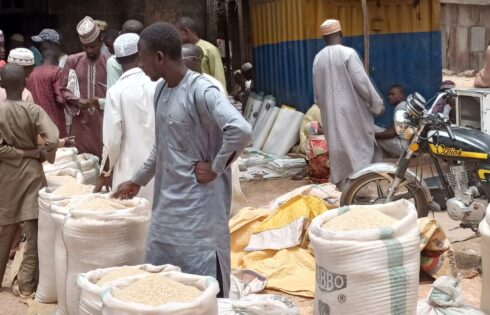
A dealer who identified himself as Malam Bala Umar told our reporter in Kano that foreign rice was very much available in the market and it is more profitable than the local one processed in the country.
He attributed this to the reopening of land borders following the federal government’s directive and smuggling activities.
Malam Abubakar Inuwa is a renowned dealer of local rice in the Kura market who has been in the business for over 25 years. He narrated his experience to our reporter when he paid him a visit to his shop.
According to Inuwa, presently, they used to buy a sack of paddy between the range of N20,000-N23,000 depending on the variety. After processing, the same quantity could be traded for N58,000-N60,000 based on the quality of processing procedures which include threshing, destoning, and polishing.
Similarly, the same bag of rice measuring up to 50kg is sold at N27,000-N28,000 as stated by Malam Inuwa while discussing with our reporter.
While lamenting on the threats posed by foreign rice on their businesses, Malam Inuwa, out of anguish said; “As you all know, many people prefer foreign rice to the one we locally produce here and this is because of the quality and superiority in the processing procedures.
“For example, in India and Thailand from where the majority of imported rice come to our country, they are using very sophisticated machines in processing rice which give it a better appearance and value than the local one.
Malam Inuwa therefore, pleaded with the federal government to provide rice millers with these heavy sophisticated equipments or ease the process for the marketers to have them imported into the country so as to bridge the widening gap.
Responding to the impact of the recent Naira redesign policy on rice marketing as implemented by the Central Bank of Nigeria, CBN, Malam Inuwa, popularly known as ‘Habu Amara’ emphasized that the policy has in several ways threatened the survival of their business.
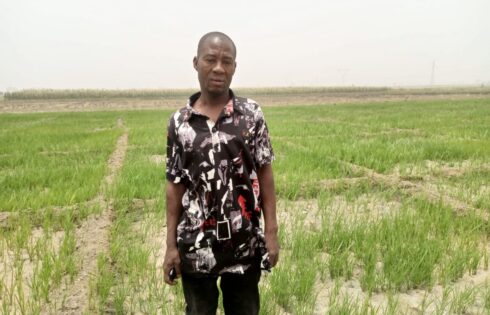
Inuwa said that they had to suspend their business for a while because local peasant farmers from whom they usually get paddy for processing and subsequent selling are not familiar with electronic transactions while the naira crunch persisted at that time.
“We are still not fully recovered from the effect. During the climax of the saga, most of us who cannot afford to pay a surcharge to get naira in cash stopped the business, because the farmers only sell their goods to someone who will pay them using cash.
“The price for paying paddy using electronic transactions is even higher than that of paying using cash as most of them [farmers] prepared to keep their goods rather than to part with them using e-transaction,” he said.
On the influence of border closure, Malam Inuwa attested to the fact that they really recorded a boom when the FG placed an embargo on rice importation at the onset of the directive four years ago, that is in 2019.
He also added that the demands for local rice were very high and it became very hard to trace foreign rice in the market as those in possession are being sanctioned accordingly.
“It was unfortunate that the demand for the local rice fell drastically when the FG ordered the reopening of some land borders which helped in allowing foreign rice to get into our markets. People suddenly began turning their desires to foreign rice because that is what they initially preferred.”
In his conclusion, Malam Inuwa harped on the government to be vigilant on monitoring marketing activities especially ‘price control’ because profits being charged by some marketers are very ‘excessive.’
While commenting on the same issue, Danmalam Mai Shinkafa also mentioned the lack of modern rice milling machines as one of their major challenges in the business.
According to him, when rice undergoes excellent and rigorous steps of processing, a 50kg bag can be sold for between N27,500-N30,000.
He also added that border closure had a significant impact in the rice production value chain in Nigeria.
“There were increased activities right from the farmers down to the millers and to us as marketers. The demand as well as the rate of selling were rapidly increasing.
“It was unfortunate that things began to fall apart when the smuggling activities became rampant, especially with the reopening of some land borders as directed by the FG.
“Closing the border was a thing of joy for us because job opportunities came for the people of this community. A lot of hooligans or idle youths became engaged in one activity or the other within the rice value chain. Also, businessmen from the southern parts of the country purchased rice in large quantities from us as a result of the border closure.” Mai Shinkafa added.
He however said the reopening of the borders has reduced patronage of local rice by traders from Southern Nigeria.
On the other hand, the investigation by Economic Confidential also discovered that despite CBN intervention to farmers through Anchor Borrowers Program, APB, the majority of them still face daunting challenges in their farming activities.
Malam Idris Atoye decried the lack of agricultural inputs as a major debilitating factor threatening farming activities.
“You know that all farming inputs such as fertilizer, seeds, and chemicals are costly. Machines such as tractors, planters or harvesters that will execute work for you are also costly to afford.
“We used to invest a lot of money into the rice production right from the field preparations, buying of inputs and cost of labour. Then suddenly this foreign rice will be legally or illicitly imported and flooded into our market with more profit margin than the local one.”
According to Atoye, this act has been causing more losses to their farming businesses.
RESPONSE BY A MAJOR DEALER IN THE SOUTH
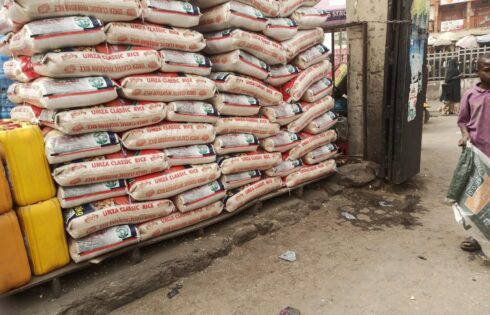
While expanding the scope of the investigation to the Southern part of Nigeria, it was found that the market price for illegally imported/smuggled rice is cheaper than the locally produced rice.
According to Chief Kingsley Muoneke, a processor and NMC Rice Distributors in Lagos, the cheapness is attributed to the fact that the said foreign rice is smuggled through porous borders where no form of levies or taxes are paid government’s coffers.
However, Mr. Kingsley stated that the price varies according to the proximity of the markets to borders through which the foreign rice is being smuggled.
He said; “Taking Lagos as an example, we have three major border routes that have the major markets. There is Alaba Rago which happens to be closed when you’re coming from Benin Republic, we also have Sango Otta Market and Ijebu Ode Market.
According to Mr. Kingsley, these are the three easiest routes through which smuggled rice floods Lagos markets including Iddo , Ileko markets and others within the metropolis.

He continued saying “when these rice reached the three places I mentioned earlier, the cost is less as they are traded between N27,000-N28,000 and by the time they cross it from Alaba Rago, Sango Otta or Ijebu Ode , they add extra charge of N1000-N1500 depending on the cost of transportation and security or police they would have to settle before reaching the market.
Having followed all these processes of stopovers, he noted that the smuggled rice can be sold between N30,000-N31,500 in the market which is cheaper than the locally produced rice that is traded for about N33,000.
Mr. Kingsley also made a revelation of how locally produced rice in Nigeria is being cloned through repackaging and sold to consumers as foreign one.
“Let me tell you what they do, they come to Kura in Kano or Benue and other major clusters of rice production and buy this local rice at N26,000-N27,000 per bag.
“Later, they will get empty foreign rice bags, repackage it there, transport it to the market, and start selling it to those who have the urge for foreign rice.
While advising the government on how to tackle this challenge, Mr. Kingsley said; “the only way to get out of this is for the Nigerian Customs Service(NCS) to step up and do their job diligently.”
He added that, at this level of illegal importation, there is no way where Nigerian rice can match up to the value and compete with its counterparts from Thailand or India.
“The Customs should man the border thoroughly while I encourage the farmers to produce more of the paddy so that it can be readily available which will make us to bring down the price of the processed rice.” Kingsley added.
FG’s Intervention in Agriculture

Recall that, during the early days of President Buhari administration, he made it clear that one of the focal points of his administration was the diversification of the economy and making Nigeria self-sufficient in food production. Thus, to begin with, he outlined plausible mechanisms aimed at revamping the ailing agricultural sector by providing intervention to farmers in form of loans. This subsequently led to the birth of the Anchor Borrowers Program, APB.
The initiative, born in Kebbi state was launched by President Buhari in November 2015. The ABP was conceived as a necessity in view of the stark reality of the country’s food insufficiency and consequent economic woes. As at 2014, the total rice production in Nigeria was less than 4 million metric tons annually.
According to Buhari “the Anchor Borrowers’ Programme has so far supported over 4.8 million smallholder farmers across Nigeria for the production of 23 agricultural commodities including maize, rice, oil palm, cocoa, cotton, cassava, tomato and livestock.”
The President disclosed this on January 18, 2022 while unveiling the FCT Mega Rice Pyramids at the Abuja International Trade Fair Complex. The pyramid was adjudged to be the biggest of its kind in Africa.
It was believed that this landmark achievement was the experimental result of the CBN’s long financing efforts of agriculture over the years through its ABP in collaboration with the Rice Processors Association of Nigeria (RIPAN).
Also, speaking at the unveiling, the CBN Governor, Godwin Emefiele, disclosed that the Apex bank had invested N1 trillion to empower at least 4,489,786, rural farmers, through intervention financing leveraging its flagship programme, the ABP.
“As at the end of December 2021, we have financed 4,489,786 farmers that cultivated 5,300,411 hectares across 21 commodities through 23 Participating Financial Institutions in the 36 states of the federation and FCT.”
Prior to the establishment of ABP, Thailand’s sole rice export to Nigeria was in the range of 1.3 million metric tons of the 3 million metric tons’ deficit. Surprisingly from the records available, Thailand 2021 was able to export 2,160 metric tons to Nigeria only. This has no doubt helped Nigeria in saving foreign exchange and preservation of jobs.
Of the average 14.6 million tons of rice produced annually in Africa, Nigeria accounts for 8 million metric tons, thereby making it the largest producer in the continent above Egypt which used to produce 4.63million tons before it suffered a decline of almost 40% in the last two years.
Nonetheless, in spite of this intervention, Economic Confidential can authoritatively posit that the smuggling of rice has continued to thrive as huge quantities of the commodity flood the local market daily.
This illegal activity has continued to truncate FG’s efforts in making Nigeria self-reliant in food production – a serious issue which the government and other stakeholders need to address quickly with the urgent attention it deserves.
This report is produced with support from the Wole Soyinka Centre for Investigative Journalism (WSCIJ) under the Collaborative Media Engagement for Development Inclusivity and Accountability project (CMEDIA) funded by the MacArthur Foundation.
By Economic Confidential

































